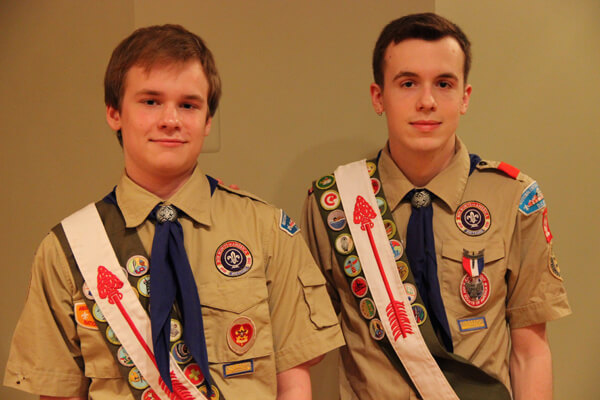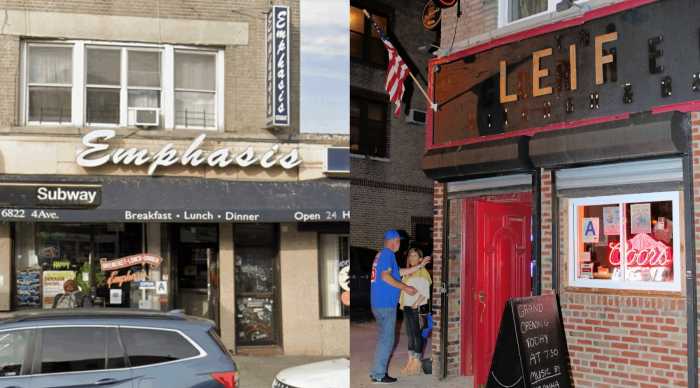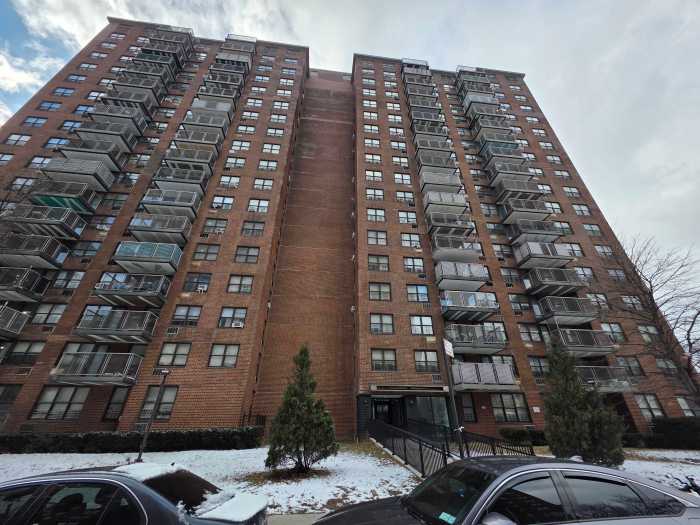Pascal and Lucien Tessier. | CHANGE.ORG
Perhaps after years of their heels dug in deeply amidst mounting PR problems, the Boy Scouts of America thought they could garner some favorable press with the announcement last week that gay members would no longer be barred from their ranks.
In late May, the 1,400 members of Scouting’s National Council will vote on a motion put forward by the group’s leadership stating, “No youth may be denied membership in the Boy Scouts of America on the basis of sexual orientation or preference alone.”
The outcry from the right wing about the proposed change may have heartened national Scouting leaders eager to push a narrative that the BSA is moving forward in a positive direction. Some frenzied critics, noting that a sizeable chunk of Scouting groups are sponsored by Catholic and Mormon congregations, warned of a catastrophe awaiting the organization.
But whether or not a troop here or there loses its sponsor, it’s doubtful that a large number of Americans are troubled by the idea that gay kids will no longer be ostracized by the Scouts. There are no doubt many, many parents who continue to harbor anxiety, even dismay about the prospect of their son being gay — and some portion of that crowd might even be squeamish about a son with gay friends — but the constituency for stigmatizing any youth is decidedly limited.
However significant it is that gay youth will no longer be burdened by the social disapproval the Scouts to date have foisted on them, the larger issue regarding gays and the BSA remains unresolved. And the message there may be more damaging to the psyches of gay youth than the policy being swept away.
Openly gay men will continue to be barred from leadership positions in the Scouts. The implication couldn’t be clearer or uglier. The BSA is telling the parents of Scouts, “Your sons will be alright if there are gay fellow Scouts among them. But don’t worry, we’ll protect them from gay adults.”
And that is exactly what they are saying as well to every gay boy who wants to join the Scouts.
BSA officials, in fact, are making little effort to hide that motivation. Deron Smith, the group’s spokesman, said the question of the role of gays in the Scouts is “among the most complex and challenging issues facing the BSA and society today.” Other Scouting officials around the country, however, pointed to surveys the BSA has conducted showing widespread unease about opening up the leadership ranks to gay men, suggesting the decision to continue the current policy on that question was an easy one.
The New York Times reported that Smith is being more circumspect, declining to elaborate on why the BSA was distinguishing between gay youth members and adult leaders who are gay. But we don’t need his explanation, we can simply look at the proposed May motion itself.
In explaining the “softened” position on gay youth joining the Scouts, the motion reads: “youth are still developing, learning about themselves and who they are, developing their sense of right and wrong, and understanding their duty to God to live a moral life.” Teenagers are, unquestionably, only beginning to “learn… who they are,” but making the point that they “are still developing” as an antecedent to declaring that gay youth can now join the Scouts is troubling.
What’s more disturbing is the lead-up to the motion’s restatement that the BSA bars adult leaders “who are open or avowed homosexuals or who engage in behavior that would become a distraction to the mission of the BSA.” A critical role played by Scout leaders, the motion explains, is in “teaching young people to make better choices over their lifetimes.” The motion also boasts that in recruiting leadership, “the programs protecting Scouts today, which include effective screening, education and training, and clear policies to protect youth and provide for their privacy, are among the best in the youth-serving community.”
So, as with so many others who are in the wrong, the Scouts are telling on themselves — it’s all there in the motion that supposedly reflects progress in BSA thinking on gays. The “better choice” for youth is heterosexuality. Youth must be protected from those who would invade their “privacy,” and the potential violators of that sacred trust are men “who are open or avowed homosexuals or who engage in behavior that would become a distraction to the mission of the BSA.”
This is standard issue Anita Bryant “Save Our Children” homophobia, circa 1977.
The dark fear the BSA is cravenly catering to no doubt imagines a 30-, 40-, or 50-something Scout leader and a 13-year-old youth. The utter banality of the underlying blood libel, however, becomes crystal clear when considering the example of Lucien and Pascal Tessier of Kensington, Maryland, brothers who are both Scouts and are both gay. Before the BSA made its announcement last week, Lucien, a 20-year-old Eagle Scout, was fighting to change Scouting’s policy after being told that Pascal, his 16-year-old brother, would not be allowed to become an Eagle Scout if he said publicly that he, too, is gay.
“I’m thrilled that under the proposed resolution, after years of service and dedication to the Boy Scouts, my brother would be eligible to earn his Eagle award,” said Lucien, whose initial effort to reform Scouting involved a petition drive on Change.org. “But what I cannot understand is why the Boy Scouts of America believes that I’m not fit to lead my brother’s troop, even though I received the Boy Scouts’ highest honor just a few years ago. If a Scout has what it takes to earn his Eagle award, surely he has what it takes to serve as an adult leader.”


































